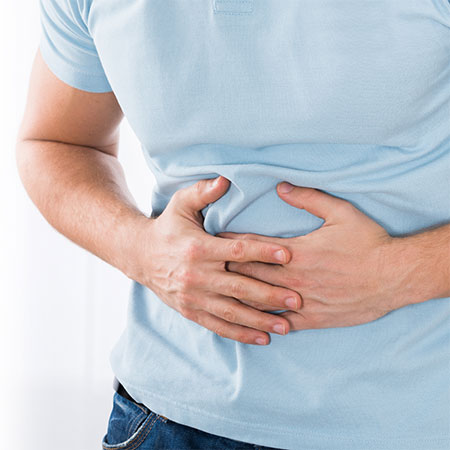No one should be prevented from enjoying a good meal in good company because of a stomach ulcer. Learn more about it.
What causes stomach ulcers?
A stomach ulcer or gastric ulcer is a lesion in the stomach lining. It is caused by the erosion of the stomach lining and exposure to stomach acids that ensure the digestion of food. Although anyone can have an ulcer in the course of their lifetime, it is more frequent in women between the ages of 55 and 65.
As a general rule, stomach ulcers develop due to “stressors” that cause the stomach lining to erode.
These stressors include:
- excess stomach acid
- bacteria called Helicobacter pylori
- some drugs, such as aspirin and other nonsteroidal antiinflammatory drugs (NSAID), and other cortisone derivatives
Additionally, some individuals have a higher risk of developing a stomach ulcer, especially those who:
- smoke
- consume too much alcohol
- must deal with high stress levels
- have a hereditary predisposition
It can sometimes be difficult to determine the exact cause of a stomach ulcer. In some cases, it is caused by a combination of factors.
What are the symptoms of a stomach ulcer?
It isn’t uncommon for someone with a stomach ulcer not to feel any particular symptoms. However, typical symptoms include:
- discomfort, pain or burning sensation in the middle of the abdomen, especially at mealtime
- abdominal cramps
- bloating
- nausea or vomiting
- weight loss or loss of appetite
An untreated stomach ulcer may heal on its own, but presents a higher risk of recurrence in the months that follow. A lack of treatment may lead to various complications, such as hemorrhaging, anemia or a stomach perforation. A stomach perforation constitutes a medical emergency often requiring surgery.
How is a diagnosis made?
A stomach ulcer diagnosis cannot be made simply on the basis of symptom assessment. The treating physician will order certain tests to confirm the diagnosis.
The doctor may order X-rays to examine the inside of the stomach. He/she may also order a gastroscopy, a medical imaging method that consists of inserting a small tube equipped with a camera into the stomach in order to assess the extent of the ulcer.
Additionally, a biopsy may be required, a sample of small portions of the stomach lining, which can then be tested to detect any abnormal cancerous cells or the presence of the Helicobacter pylori bacteria. The doctor may also order a simple breath test or blood or stool analysis to determine the presence of the bacteria.
What are the treatment methods?
To treat a stomach ulcer, it is first necessary to identify the factors involved. If the Helicobacter pylori bacteria is detected, it will be recommended that you take a combination of drugs to eliminate it. The treatment will last a few weeks and you must take all of the medication exactly as prescribed during that time to get rid of the bacteria permanently.
Over-the-counter medication can bring temporary relief of your symptoms, but it won’t heal your stomach ulcer. If you are considering to take medication without a prescription, such as an antacid, it is essential to ask your pharmacist for advice. Depending on the frequency, severity and duration of your symptoms, he/she can tell you if you need to see a doctor.
If your stomach ulcer is caused by a drug, your doctor might ask you to stop taking it or prescribe a different one. In some cases, adding a drug made to protect the lining of the stomach may be beneficial. The drugs most often prescribed for this purpose are part of the proton pump inhibitor (PPI) class. They are often used in the case of a stomach ulcer, even when it isn’t caused by a drug.
How to prevent stomach ulcers
There is no way to prevent a stomach ulcer entirely, but some things can help you reduce the risk of having one, for instance:
- Make it a habit to eat slowly and take small bites
- Drink plenty of water
- Avoid acidic beverages (citrus juice, coffee, tea, soft drinks, tomato juice, etc.)
- Avoid spicy or fatty foods
- Limit your consumption of chocolate and mint
- Drink alcohol in moderation
- Quit smoking
- Avoid stress and get adequate sleep
Speak to your pharmacist for additional information about stomach ulcers and the ways to prevent or treat them.

